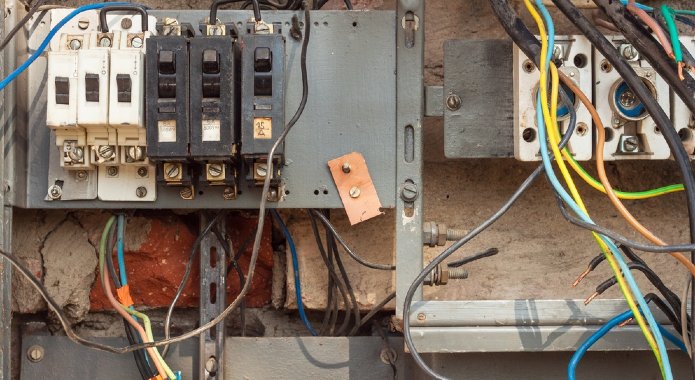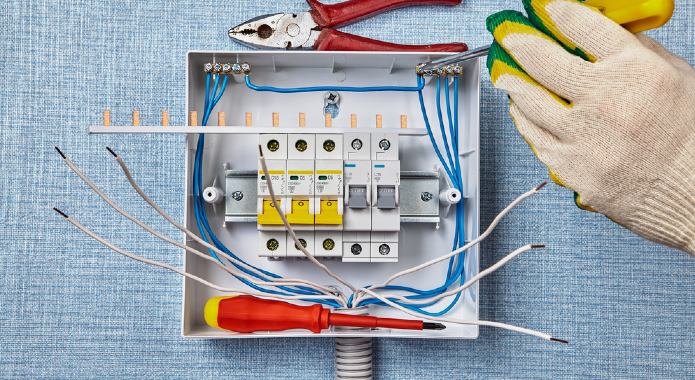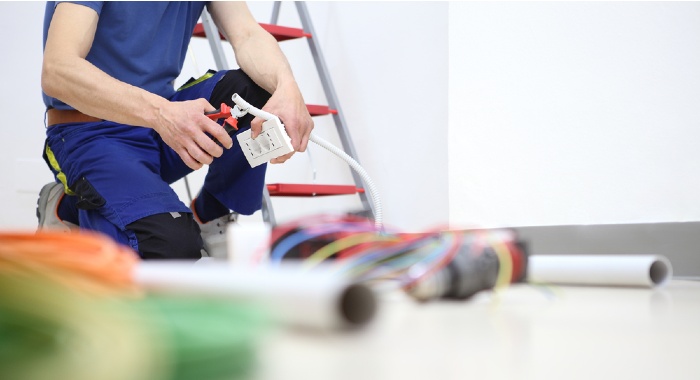It’s a question that will arise for most homeowners at some point, and that is: ‘How often should a house be rewired?’
If your home is more than 25 years old, it’s probably time for a rewiring.
However, if you’re not sure whether your home needs rewiring, it’s always best to consult with a professional electrician.
But some other issues need to be considered too, as the Property Road team highlights in this article.
The average lifespan of electrical wiring in your home
The average lifespan of electrical wiring is approximately 25 to 40 years.
While that may sound like a long time, you need to be aware that over time, wires can become worn and brittle, which can lead to fires and other safety hazards.
If you suspect something is wrong with your wiring, you should have it checked and, if necessary, replaced by a qualified electrician.
Also, if you live in an older property, your wiring may not be up to current standards – so you’ll have to replace it sooner than the average lifespan.
Factors that can affect how often your home needs to be rewired
Several factors can affect how often your home needs to be rewired, including, for example, if you live in an area with a high risk of flooding. Then your wiring may need to be replaced more frequently.
And if you have made any significant changes to your electrical system, such as adding new appliances or installing a new fuse box, your wiring may also need to be replaced.
The benefits of having your wiring replaced
Having the wiring replaced in your home will:
- Make it safer as old and damaged wiring is one of the leading causes of house fires;
- Improve the efficiency of your electrical system as new wiring can handle more power;
- Increase the value of your property as new wiring is seen as an improvement;
- Rewiring will give you peace of mind knowing that your home is up to date with current safety standards.
Old wiring – what to look out for

If your home’s wiring is not the modern PVCu coated type, then it’s likely you need a rewire. Also, if you have:
- Old rubber insulated cabling;
- Fabric insulated cabling;
- Lead insulated cabling.
Then your home needs rewiring.
The big risk of having these old wires in your home and not replacing them is that the wires can break down and create a short circuit – and a fire hazard. There’s also the risk of electrocution.
However, you also need to be aware that older PVCu cables may need replacing if they haven’t been ‘twin-earthed’ – that is, cabling that has a second earth cable that runs within the outer sleeve.
DO NOT check the wiring without first switching off the mains.
You can arrange for a qualified electrician to carry out a survey to determine what is necessary – and how much the work will cost.
An electrician can carry out a survey with a verbal report for £100-150, while a full electrical survey that comes with a written report will cost between £200 and £350.
Does my house need rewiring?
There are a few signs that could indicate that your house may need rewiring. For example:
- Lights that flicker and/or change;
- Breakers that trip frequently;
- Regularly blown fuses;
- Exposed worn wires;
- Faulty power outlets;
- People getting electric shocks.
All of these issues should be seen as a warning flag and will mean that a rewire is urgently needed.
Indeed, knowing when to rewire a home is crucial to preventing risky situations like electrical fires that could harm occupants and destroy your home.
Some of the issues listed above could be a sign that your wiring is not able to handle the amount of power you are using
And if you notice any sparks or smoke coming from your electrical sockets or appliances, this is also a sign that your wiring may be damaged and needs to be replaced.
Also, if your home was built before the 1970s, it is likely that the wiring does not meet current safety standards.
You will also need to consider rewiring if:
- If you are undertaking remodelling work that will be seen as a ‘material alteration’ under Building Regulations. You may only need to rewire these areas and not all of your home. This might also include upgrading the consumer unit or fuse box.
- If you extend your home, or convert the garage or attic. This is new work, and the new wiring must conform to Part P: Electrical Safety – and the rest of the property’s wiring may also need upgrading to cope with the electrical load.
Has my home been rewired?

If a house has recently been rewired, you should be able to tell by looking at exposed wiring, as well as the energy meter and fuse box (though this is now called the ‘consumer unit’).
Also, when being shown around a property you are considering buying, you can request to do this.
The likelihood that the property requires a complete rewiring increases if there is an old-fashioned fuse box with large white ceramic-style fuses.
Otherwise, unless you contact the builder or there is evidence from an electrician as to when they carried out any work, you will struggle to find out how old your installation is.
Is rewiring a house yourself safe?
There is a very simple answer to the question, ‘Is rewiring a house yourself safe?’
And that is ‘No’.
That’s because rewiring a house is a complex job that should only be carried out by a qualified electrician. Even if you fancy yourself as a DIYer, or are confident around electricity, this can be a dangerous job to undertake.
And don’t forget that doing the work yourself could damage your property and lead to expensive repairs.
It’s also worth appreciating that your house insurer may not pay out if the cause of a house fire is down to the rewiring work being poorly completed.
So, while it isn’t illegal for you to complete your own rewiring, you will still need to notify building control and understand your home insurance may be affected.
How disruptive is rewiring a house?
Rewiring a house can be disruptive, but the level of disruption will depend on:
- The size and age of your property;
- If your home has multiple floors as it may take longer to complete the work;
- If your property is old or has complex wiring.
In most cases, electricians will try to minimise the disruption by working around your schedule.
They may also be able to work evenings or weekends to avoid disrupting your daily routine, and the work will take between two and 10 days to complete.
This is not a quick or easy job – and it’s one that needs to be completed correctly.
In fact, you will be amazed at the amount of electrical cable running around your home.
What are the rewiring a house regulations?

There are several regulations for rewiring a house that must be followed to protect you and your family – and reduce the chance of electrical fires.
You must first contact the local authority and give their building control department advance notice before starting.
Any work must also adhere to Part P of the building regs.
By hiring an electrician, you can relax knowing that all building regs will be observed during the house rewire process.
It’s also a good idea to use an electrician who is certified with NICEIC so they can certify any work they do – and ensure that everything is done legally.
To ensure safety and security, all newly installed and updated wiring must adhere to the most recent Building Regulations.
How much does a house rewire cost?
A home rewire is a big job. It can be expensive, but the advantages of a safer electrical system for your family are worth it.
Costs for a home rewire can range from £1,500 to £10,500, depending on the size of your house – and its age.
It’s always worth getting a few quotes from electricians to see what the potential bill could be.
And don’t forget that once the rewire is complete, you might need to redecorate or carry out building work. That means you will be spending:
- Painter/decorator will cost around £20ph;
- Builder will charge up to £30ph.
Don’t forget too that it will cost to submit building regs at £100 – £125, and a building regs inspection will cost between £200 – £400.
Why does rewiring a house cost so much?
Not only do electricians charge between £25 and £50 an hour, but the work also to rewire a property is a dirty and involved business. You need experts to do this for you.
To help understand why rewiring costs so much, below are some other factors to consider:
- The house size is crucial. A 3-bed property will take up to two days, but a 5-bed property will take much longer. Indeed, it is your home’s floorspace that will dictate how much the bill will be.
- The number of sockets and light fittings will also affect the cost – and how much wiring will be needed.
- Be aware, too, that if yours are solid walls, this will take more time to complete.
- Hollow walls are easier to work with since they are made from plasterboard and stud partitions.
- While you can save on the quality of fittings to save money, you should use quality items. Also, you can opt for more expensive fittings made from brass.
- Bathrooms will need special wiring, and the fittings will depend on the appliances you have. For example, you’ll need special light switches for the bathroom in case someone uses wet hands to switch the light on or off.
- The shower will need its own power supply that comes direct from the distribution box.
Rewiring a kitchen can be expensive because it is so labor intensive. The kitchen will need more electrical sockets than any other room so the electrical appliances can be used. Also, the electric oven and hob will also need a direct power supply.
It’s also worth appreciating that growing numbers of householders are now looking at installing a charging point for an electric car – this could be a big job to undertake.
How often should a house be rewired?
Don’t be put off having your home rewired because it is a disruptive and messy task, or you’ll have to budget for the cost of making the walls and ceilings good again.
Indeed, rewiring your house shouldn’t be where you cut corners.
That’s because bad wiring has the potential to cause major fire hazards, as well as electrocution or injury to occupants of the home.
The bottom line is that rewiring your home is not only a necessity when it is obvious there are electrical dangers – it’s also an investment into your home to protect you and your family.




